The Criminal Case In A Nut Shell: A 9 Part Series, Part 1: The Stop and Arrest

Have you or a loved one ever been arrested and charged with a crime? Most of the time the answer is no. The criminal justice system can be overwhelming to someone who is unfamiliar with the process. The Law Offices of Michael H. Ricca P.C. is here to ease the burden on you during this difficult time, along with guiding you through the criminal case process, beginning with when you are first arrested.
The thought of being arrested can be intimidating to someone who has never been through the legal system before. Law enforcement may stop and arrest you in various ways. Law enforcement may stop your vehicle if they believe that you are in the commission of a crime (ex. DWI) or if they have reason to believe that your vehicle was used in the commission of a crime (ex. Your vehicle matches the description of a vehicle in a reported crime). If you are stopped by law enforcement in your vehicle, law enforcement may approach you and request to see your driver’s license, registration, and sometimes they will also ask for your car insurance information. You should be prepared to provide these items to law enforcement as this is standard procedure so they can run a background check on you. This check will inform law enforcement if there are any outstanding warrants for your arrest as well as any other pertinent background information that may be of relevance. After law enforcement has reviewed the documentation you have provided, they may ask to search your vehicle without a warrant. It is important for you to clearly state that you do not consent to a search of your vehicle as a matter of protecting your rights. While law enforcement may search your vehicle if you are arrested or they believe they have probable cause to search your vehicle, it is still critical to make your objection known for the record. If law enforcement suspects that you may be under the influence of alcohol and/or drugs, you may be asked to take a breathalyzer test or field sobriety test. You do not have to submit to either test, however, failure to do so can result in fines and time in jail as well as civil forfeiture of your vehicle. You may also lose your driver’s license for up to 1 year. If law enforcement has determined that probable cause exists, you may be arrested, placed in hand cuffs, and put in the back of a police vehicle.
You may be stopped while out and about and minding your own business. Law enforcement only has the right to stop and detain you for questioning if they have a reasonable suspicion that you have committed a criminal offense, are in the act of committing a criminal offense, or are about to commit a criminal offense. When you are stopped by law enforcement, you have the right to ask if you are under arrest or if you are free to leave. While you are not required to carry identification in New York State nor are you required to provide identification to law enforcement in New York State, if law enforcement determines there is probable cause for an arrest, you may be detained until law enforcement can validate your identity. It is crucial that you do not walk away from the law enforcement officer until you are sure the law enforcement officer has cleared you as this can lead to your arrest as well. If you unsure, you can ask the law enforcement officer if it is OK to leave.
Law enforcement may come to your home to arrest you. If you are arrested in your home, law enforcement may search your body as well as the immediate surrounding area. If they have a warrant to search your home, be sure to ask to review the warrant to ensure the information is correct, including the address on the warrant.
Here are our top three tips for conducting yourself when stopped by law enforcement:
- Keep your hands where law enforcement can always see them. If you need to reach for something they have asked for such as your driver’s license, inform the law enforcement officer of what actions you are about to take so they are aware.
- Remain calm and maintain control of your emotions, words, and body language. If you step out of your vehicle, resist the urge to lean against your vehicle, as that can make you look impaired.
- Remember that anything you do or say can be used against you in court. Tell the law enforcement officer that you are expressing your right to remain silent and wish to speak with your attorney.
Once you arrested and transported to the police station, it is important to remember that you always have the right to remain silent. You should not answer any questions from law enforcement before speaking with an attorney. The only information you should provide is your full name and address. You should remain polite and calm when speaking with law enforcement, however, you do not need to provide them with any additional information. Law enforcement may try to intimidate you into thinking that speaking with them is in the best interest of your case, however, this is just a scare tactic and once you request a lawyer, law enforcement must stop questioning you. You have the right within a reasonable time after your arrest to contact a family member or friend. It is critical to not disclose any information about your case over the phone as you do not know who is listening or if your call is being recorded by law enforcement. Further, do not sign anything without first consulting with an attorney.
Here are our top three tips for what to do after you have been arrested:
- Immediately ask for an attorney. Do not do or say anything else to law enforcement without first consulting with an attorney.
- As soon as you can do so, write down (not for law enforcement and do not provide to law enforcement) everything you can remember regarding the incident that led to your arrest, including the badge numbers of the law enforcement officers, patrol car numbers, as well as their physical descriptions.
- If you are injured by law enforcement during your stop and arrest, take photos of your injuries as soon as possible. It is important to make sure you receive medical attention and ask for a copy of your medical treatment as well.
Check back next week for Part 2: The Arraignment as we continue to help you navigate through the criminal case process.
If you or a loved one has been arrested, contact our attorneys at The Law Offices of Michael H. Ricca, P.C. at (516) 500-1647 once you are able to do so for your free telephone consultation or visit us online at www.NassauCountyTrafficLawyer.com and complete our legal consultation form.
